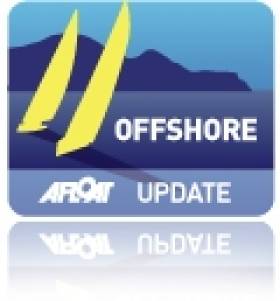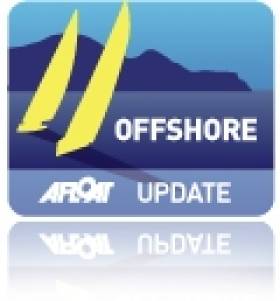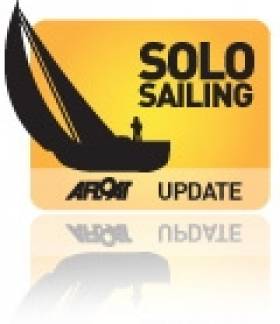Displaying items by tag: Chris StanmoreMajor
Three Boats arrive in Punta del Este within 80 minutes
After nearly four weeks at sea and more than 6,700 miles of racing through the Southern Ocean and the South Atlantic from New Zealand to Uruguay, the fight for second place came down to a nail-biting drag race to the finish line.
As a flotilla of boats took to the waters off Punta del Este to witness the finale and welcome in the skippers they were greeted by two unmistakable shapes on the horizon – Operon Racing and Spartan neck and neck, separated by less than a mile. With around a mile to the finish line it was CSM who had the slight advantage but after taking a course too close to the shore he was forced to gybe twice to lay the line, allowing Gutek to capitalise.
In an amazing photo finish it was Gutek who emerged the victor, sneaking in front of CSM right at the last moment to clinch second place by less than a minute. Gutek crossed the finish line at 4.40pm local time (1840 UTC) after 25 days, 17 hours and ten minutes. Forty seconds later, CSM crossed.
And in an exhilarating conclusion to the leg, Canadian Derek Hatfield blasted across the line just over an hour later after 25 days, 18 hours and 22 minutes. Following Brad Van Liew's win on Tuesday afternoon, all four boats arrived in just over 48 hours of each other.
"It was a fight to the end and I won," Gutek said after stepping on to the dockside to rapturous applause from the waiting crowds. "This second place is the best of all of them, much better than in Wellington and Cape Town. I am really proud."
Moments later it was CSM's turn to join his fellow skippers on dry land. "This sprint has proven I have a fast boat and I have taken the handbrake off now and I think we have a good chance for the next leg," he said. "We have lost out on second place and that's a great pity, I wish we were parked one boat closer to Brad, but I think we have made our point – we know what we're doing now and we can go fast."
"Never in a 6,000-mile leg have I seen a finish this close," Derek added. "It was incredible. All I can say is wow, what a race. It was so close, I loved it."
Ocean sprint three has by no means been easy going for any of the VELUX 5 OCEANS skippers. In the middle of the Southern Ocean, thousands of miles from anywhere, CSM's mainsail ripped and he was forced to spend 30 hours stitching it in horrendous weather conditions. He also had to contend with rips in one of his foresails as well as a major water leak onboard Spartan.
Gutek faced a nervous rounding of the mighty Cape Horn when keel problems developed onboard Operon Racing. After a composite part on the yacht's keel pins broke, the keel started to move several millimetres, making a dull knocking sound. Gutek was forced to fully cant the keel for the remainder of the race, affecting his performance.
Onboard Active House Derek was dealing with an engine oil leak which meant he could only charge his batteries when on port tack. After holding on to second place until just two days from Punta del Este, it was low power to his wind instruments that was Derek's eventual downfall.
"The results of this leg really bode well for the future of the Eco 60 class," Derek concluded. "Here we have recycled older boats that are so competitive and level – it makes for great racing."
Ocean sprint four will see the fleet sprint 5,800 nautical miles to Charleston, starting on March 27.
FINAL POSITIONS:
1st Brad Van Liew - 23 days, 17 hours and 46 minutes
2nd Zbigniew Gutkowski - 25 days, 17 hours and 10 minutes
3rd Chris Stanmore-Major - 25 days, 17 hours and 10 minutes 40 seconds
4th Derek Hatfield - 25 days, 18 hours and 22 minutes.
SKIPPER QUOTES:
Gutek: "The end to my sprint three story is amazing. This second is the best of all of them, much better than in Wellington and Cape Town. I am really proud. For the last 48 hours I worked so hard to get every last bit of speed out of my boat. Six miles from the finish I was leading Chris, and then more wind came and he went past me. I hoisted my gennaker and we were neck and neck. It was a fight to the end and I won."
CSM: "It's been a very interesting day. This morning I got a position update saying Gutek was only one mile behind me. I was hoping that the tack I was about to do would put me ahead of him but I saw him about 11am pass in front of me about a mile ahead. He is sailing that boat out of his skin. I just couldn't catch him going upwind. Then the wind clocked round so we were on a reach and that's what Spartan does best. Suddenly we were doing 13 or 14 knots and we chased Gutek down pretty quickly. Coming into Punta I had about a fix-boat lead on him and everything was looking really good. Then, coming towards the line I got too close to a patch of rocks which was an error on my part. I had been on deck concentrating on the sailing. I had to put two gybes in to get to the finish line and that allowed Gutek to pass me in the dying moments. I ended up finishing 40 seconds behind him rather than 40 seconds ahead, but that's racing, that's what it's all about. This sprint has proven I have a fast boat and I have taken the handbrake off now and I think we have a good chance for the next leg. We have lost out on second place and that's a great pity, I wish we were parked one boat closer to Brad, but I think we have made our point – we know what we're doing now and we can go fast."
Derek: "All I can say is 'wow, what a race'. It was so close, I loved it. It was a lot of work but not as much effort as sprint two. It was a good leg, a fun leg. We had a really fast passage to Cape Horn and then an amazing rounding of the Horn within a mile of the coast. The second part from Cape Horn, the last 1,000 miles, was the most difficult part. Not that long ago I was in second place but all I can say is in the last few days the wheels really fell off. Because of the oil leak in my engine my power got so low that my wind instruments wouldn't work. In the dark I was going back and forth trying to get upwind, and that's when Gutek got away. It was mine to lose. The results of this leg really bode well for the future of the Eco 60 class – here we have recycled older boats that are so competitive and so level. It makes for great racing. Never in a 6,000-mile leg have I seen a finish this close, it was incredible."
Velux 5 Oceans Skippers Prepare for Storm
Velux 5 Oceans skippers are battening down the hatches as a summer storm surges towards the fleet in the Southern Ocean - with giants swells and winds of more than 40 knots expected
“I’m a little anxious, I want to make sure I take care of the boat,” said sprint leader Brad Van Liew, American skipper of the Eco 60 'Le Pingoui'.
"If it doesn’t bring too much unexpected weather we could get some good fast sailing from it. If it ends up bringing a lot more wind than forecast it could be a lot more dangerous.”
Van Liew and his fellow racers have already spent three weeks at sea in the second ocean sprint, covering 5,000 nautical miles, with 2,500 left to go to the finish line in Wellington, New Zealand.
At this stage speed is of the essence, but safety is paramount - the Velux 5 Oceans skippers must make sure they they stay in the race if they want to contend for a podium finish.
As of 6pm yesterday, Le Pingouin was in the lead ahead of Zbigniew Gutkowski in Operon Racing, Derek Hatfield in Active House and Chris Stanmore-Major's Spartan.
Chris Stanmore-Major Completes First Ever Solo Ocean Race in 36 Days
BRITISH skipper Chris Stanmore-Major today became the fourth skipper to complete the first ocean sprint of the epic VELUX 5 OCEANS solo round the world yacht race. After 36 days and 44 minutes at sea, the 33-year-old from Cowes, Isle of Wight, crossed the finish line in Cape Town, South Africa, at 4.44pm local time in beautiful weather conditions.
Chris, known by his nickname CSM, sailed 7,849 nautical miles on his 60ft ocean racing yacht Spartan at an average speed of 9.08 knots on the gruelling solo sprint from La Rochelle in France. It was a huge accomplishment for CSM, an experienced ocean yachtsman but a newcomer to singlehanded ocean racing.
"I'm pretty jubilant to be here," said CSM, arriving at the North Wharf at the Victoria and Alfred Waterfront where he was welcomed in by his fellow skippers Brad Van Liew, Zbigniew Gutkowski and Derek Hatfield. "Sailing 7,800 nautical miles on your own in the first leg of the VELUX 5 OCEANS is a pretty big challenge and it's one I've now completed. There have been some challenges but we – me and Spartan – have made our way through them. I knew it was going to be a learning curve and it was.
"I made lots of mistakes but I managed to come back from them and continue on. It's been hugely challenging but the boat's lasted pretty well. I think she can be quicker but I've got to be a bit smarter. I'm just very pleased to be in."
CSM joined the VELUX 5 OCEANS line up less than two months after completing the Clipper Round the World Yacht Race in which he skippered a 68ft yacht with an 18-strong crew of amateur sailors. His first foray into solo ocean racing was a baptism of fire which began moments after the starting gun on October 17, minor breakages onboard his Eco 60 Spartan hampering his start.
After shooting up through the rankings into second place behind American race leader Brad Van Liew as he crossed the Bay of Biscay, CSM then chose to hug the coast of Portugal and paid the price when he was becalmed for several days, allowing Polish ocean racer Gutek and Canadian rival Derek Hatfield to slip past.
Then, a week after the start, the fitting holding the massive spinnaker to the front of Spartan shattered and the giant sail flew up in the air, attached only by one rope at the top of the 28-metre high mast. It was the second time the fitting had broken in two days and it caused substantial damage to Spartan. Recovering the sail from the water took CSM several exhausting hours.
After passing the Equator Chris turned his attentions to hunting down third placed Derek Hatfield, and at one point was just 100 nautical miles behind. It was a close fight right until the end of the leg, with Derek arriving in Cape Town just over 48 hours ahead of CSM.
"The prospect of hot food is a nice one," CSM added. "My gas stove stopped working a week ago so I haven't had hot food for seven days – I've been warming things up on the engine! Beer is tasting good right now too so I'm looking forward to having another one, a steak, a salad and some chill-out time."
CSM also had a few unexpected visits from nature during the ocean sprint. While crossing the Doldrums Spartan sailed through a cloud of insects which stayed with CSM for most of the following 4,000 nautical miles to Cape Town. Then, a few days before finishing the leg, a whale burst out of the water showering Spartan in a plume of spray.
Ocean sprint one, the first of five legs that make up the 30,000 nautical mile VELUX 5 OCEANS, was won on November 14 by Brad Van Liew. At the last position report at midday UTC, Belgian ocean racer Christophe Bullens had 2,833 nautical miles left to sail.
Ocean sprint 1:
Brad Van Liew finished November 14, 28 days, 1 hour, 51 minutes
Gutek finished November 17, 31 days, 6 hours, 3 minutes
Derek Hatfield finished November 20, 33 days, 22 hours and 37 minutes
Chris Stanmore-Major finished 36 days, 0 hours and 44 minutes
Knox Johnston Unveils Two British Skippers for Velux 5 Oceans
Not since Sir Robin-Knox Johnston sailed into the record books as the victor of the Golden Globe back in 1969 has a British skipper won a singlehanded round the world race. But that could all be about to change as Sir Robin himself today announced not one but two British sailors who will compete in The Ultimate Solo Challenge: the VELUX 5 OCEANS.
Chris Stanmore-Major, 32, and Simon Chalk, 37, will both go head to head with an international fleet of skippers in the gruelling 30,000-mile solo yacht race, which starts from La Rochelle in France on October 17. Stanmore-Major – known as CSM – and Chalk are experienced and talented yachtsmen and are each capable of becoming the first British skipper to win a solo round the world yacht race in 41 years.
CSM, from Cowes on the Isle of Wight, has only just got back from ten months at sea skippering the Qingdao entry in the Clipper Round the World Yacht Race but already has his sights firmly set on his next adventure. The VELUX 5 OCEANS will be CSM's first major singlehanded race and he is keenly aware of the challenge ahead.
"It's a big step up for me and a quick turnaround from the Clipper Round the World Race," he said, "but it's what I have wanted to be involved in for a long time and I am still in race mode. The crazy sleep patterns and relentless work now seem normal. Solo sailing is certainly new territory but that is the challenge. Everything comes down to the individual and if something goes wrong there is nowhere to hide – it's just me, the boat and the ocean. Sir Robin is still the only Briton to have won a solo round the world yacht race - surely 41 years is long enough for any record to stand!"
Chalk, from Leicester, got his first taste of sailing in 1996, when, aged 24, he took part in the BT Global Challenge. His first ever trip on a yacht saw him sail from Brazil to New Zealand via the Southern Ocean, rounding the infamous Cape Horn in the process. A keen adventurer, Chalk hit the headlines in 2003 when he became the first Briton to row solo across the Indian Ocean, and holds nine Guinness World Records in ocean rowing.
He said: "I am delighted to be taking part in the VELUX 5 OCEANS. This is a great opportunity to extend my ocean experience, take on a new challenge and compete against some of the world's best sailors. Safety and reliability will underpin my campaign. Ocean Planet is a proven boat – let's see what she can do."
CSM and Chalk have their backgrounds rooted firmly in amateur round the world yacht races like the Clipper Round the World Yacht Race and the BT Global Challenge. These races have given rise to some of the biggest British names in ocean sailing. Sailors such as Dee Caffari, Mike Golding and Alex Thompson all started out in such races and are now considered among the best solo sailors in the world.
Both will be racing in the Eco 60 class, introduced by the VELUX 5 OCEANS as a sustainable, affordable alternative to the latest generation Open 60 yachts. The class utilises Open 60s launched before 2003 which have already had successful racing careers, effectively recycling them and reducing the sport's carbon footprint. CSM will race Sir Robin's boat Saga Insurance, the yacht had originally been chartered by 19-year-old Brit Oscar Mead for the race but Mead has now officially withdrawn his entry so that he can concentrate on his studies and aim for the 2014/15 edition of the VELUX 5 OCEANS. Chalk will race the Eco 60 Ocean Planet, built by American yachtsman Bruce Schwab and raced in the VELUX 5 OCEANS in 2002/3 as well as the 2004/5 Vendée Globe.
Sir Robin Knox-Johnston, chairman of the VELUX 5 OCEANS, unveiled the skippers at a special event at Cowes Week. He said: "Chris and Simon are fantastic yachtsmen who have more than proven their sailing capabilities. It is great to have two British skippers in the race and maybe one of them can be the first Briton to win a solo round the world race since I did in 1969."
The VELUX 5 OCEANS, run by Clipper Ventures PLC, is the longest running solo round the world race, and has 28 years of rich heritage as the BOC Challenge and then the Around Alone. This edition features five ocean sprints over nine months. After heading from La Rochelle to Cape Town, the race will then take in Wellington in New Zealand, Salvador in Brazil and Charleston in the US before returning back across the Atlantic to France.


























































